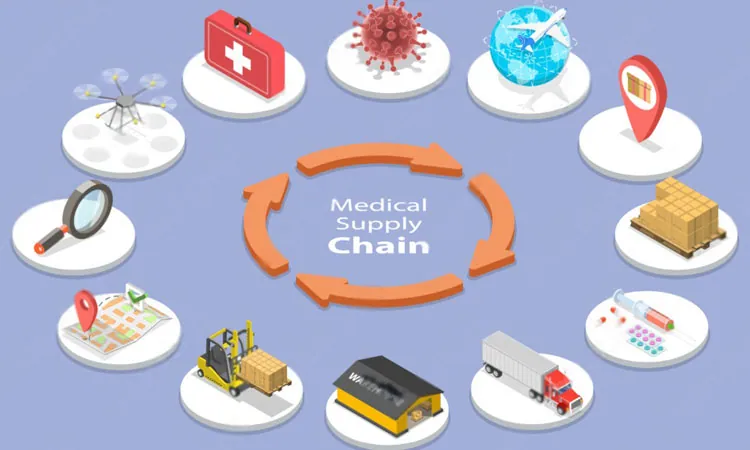In today’s rapidly evolving healthcare landscape, the resilience of medical supply chains has become a focal point of concern. With the global interconnectedness of supply and demand, any disruption can lead to significant challenges, impacting patient care and the overall functionality of healthcare facilities. This article delves into the strategies healthcare facilities can implement to navigate and mitigate the effects of medical supply chain disruptions, ensuring a continuous flow of essential supplies.
Understanding Medical Supply Chain Disruption
Medical supply chain disruption can stem from a variety of sources including natural disasters, geopolitical tensions, or pandemics, affecting the availability of critical medical supplies. These disruptions can lead to shortages of essential items such as pharmaceuticals, personal protective equipment, and surgical tools, severely impacting patient care. To address these challenges, healthcare facilities must develop robust contingency plans. This involves conducting thorough risk assessments to identify potential vulnerabilities in their supply chain and developing strategic partnerships with a diverse range of suppliers to ensure a consistent supply of essential products.
Moreover, embracing technology can play a pivotal role in mitigating these disruptions. Advanced analytics and real-time tracking systems can provide valuable insights into supply chain operations, enabling healthcare facilities to anticipate shortages and respond proactively. By leveraging these technological advancements, healthcare facilities can enhance the resilience of their supply chains, ensuring they are better equipped to handle unexpected disruptions.
Optimizing Logistics through Commercial Truck Leasing
In the quest to bolster the medical supply chain, optimizing logistics is paramount, and this is where commercial truck leasing comes into play. By leasing a fleet of commercial trucks, healthcare facilities can gain more control over their logistics operations. This not only ensures the timely delivery of medical supplies but also reduces dependency on third-party logistics providers. Commercial truck leasing offers flexibility and scalability, allowing healthcare facilities to adjust their fleet according to their changing needs.
Furthermore, leasing commercial trucks can be a cost-effective solution. It eliminates the need for a substantial upfront investment in purchasing vehicles and reduces maintenance and repair costs, as these are typically covered by the leasing company. This financial flexibility allows healthcare facilities to allocate more resources toward improving patient care and investing in other critical areas. By integrating commercial truck leasing into their logistics strategy, healthcare facilities can enhance the efficiency and reliability of their supply chain operations.
Strengthening Supplier Relationships
Building strong relationships with suppliers is crucial for a resilient medical supply chain. Healthcare facilities should strive for transparent and collaborative partnerships with their suppliers. Regular communication and joint planning can help in anticipating and mitigating supply chain disruptions. By understanding each other’s capabilities and constraints, both parties can work together to find innovative solutions to logistical challenges.
In addition to fostering strong relationships, healthcare facilities should also consider diversifying their supplier base. Relying on a single supplier or a limited number of suppliers can be risky, especially if they are located in regions prone to political instability or natural disasters. Having a diverse range of suppliers ensures that healthcare facilities can pivot and adapt when one source becomes compromised, thereby maintaining a steady supply of essential medical goods.
Leveraging Data Analytics for Predictive Insights
Data analytics can provide predictive insights that are invaluable for managing medical supply chains effectively. By analyzing historical data and current market trends, healthcare facilities can forecast potential disruptions and take preemptive measures. Predictive analytics can identify patterns that precede supply shortages, allowing facilities to stockpile essential items or seek alternative suppliers proactively.
Moreover, data analytics can optimize inventory management, ensuring that healthcare facilities maintain an optimal stock level—not too high to incur unnecessary costs, and not too low to risk shortages. With the help of advanced data analytics tools, healthcare facilities can make data-driven decisions, improving the efficiency and resilience of their supply chain operations.
Conclusion: Paving the Way for a Resilient Future
In conclusion, addressing medical supply chain disruptions requires a multifaceted approach. From understanding the nuances of supply chain disruptions to optimizing logistics through commercial truck leasing, strengthening supplier relationships, and leveraging data analytics for predictive insights, each strategy plays a vital role in enhancing the resilience of healthcare facilities. By adopting these strategies, healthcare facilities can not only navigate the complexities of today’s global supply chains but also pave the way for a more robust and resilient future. As the healthcare industry continues to evolve, the ability to adapt and respond to supply chain challenges will be paramount in ensuring the uninterrupted delivery of critical medical services.

